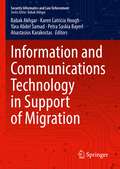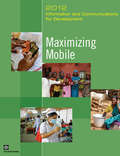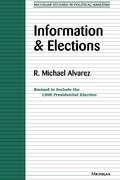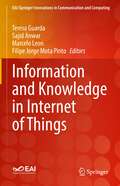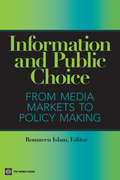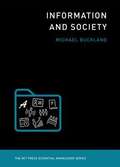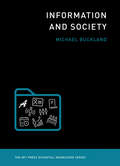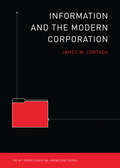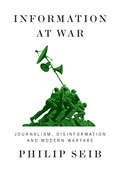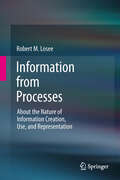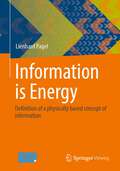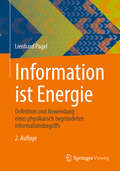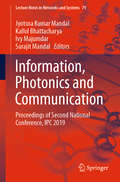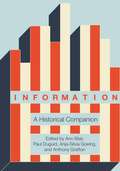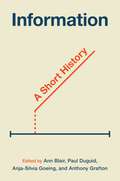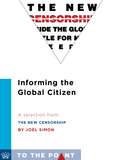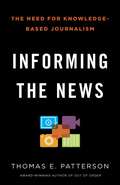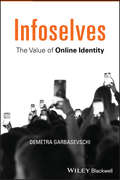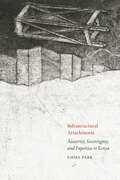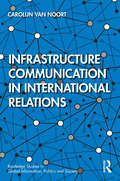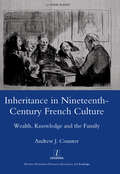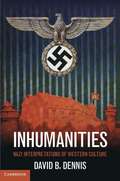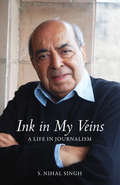- Table View
- List View
Information and Communications Technology in Support of Migration (Security Informatics and Law Enforcement)
by Babak Akhgar Petra Saskia Bayerl Karen Latricia Hough Yara Abdel Samad Anastasios KarakostasThe book provides a holistic review, presenting a multi-stakeholder, multi-disciplinary, international, and evidence-based approach to Information and Communications Technology (ICT) in migration. The book brings together different views and multifaceted responses to ICT-based migration management, examining their overlap, conflict, and synergies. The book is a major addition to the field, tackling important debates concerning humanitarianism and securitization in the reception of migrants, as well as exploring the role of digital technology in aiding migrant integration. The authors explore contentious areas such as the use of new technologies deployed on borders for migration management and border security under the umbrella of smart border solutions including drones, AI algorithms, and face recognition, which are widely criticized for ignoring the fundamental human rights of migrants. The research presented will depart from the euphoric appraisals that technology has made things easier for migrants and those who assist them, to critically examine the bane and boon, benefits and afflictions, highlighting the barriers, as well as the solutions, including several under-researched aspects of digital surveillance and the digital divide.This edited volume has been developed by the MIICT project, funded under the EU Horizon 2020 Action and Innovation programme, under grant agreement No 822380. Provides a positive approach to the integration of migrants, asylum seekers, and refugees using Information and Communications Technology (ICT) solutions Offers a strategic approach to providing digital services for migrants at an EU, national and local level Bridges the gap between academia and front-line practitioners’ work by providing theoretical, policy, ethical, and methodological recommendations
Information and Communications for Development 2012
by World Bank StaffWith some six billion mobile subscriptions now in use worldwide, around three-quarters of the world's inhabitants now have access to a mobile phone. Mobiles are arguably the most ubiquitous modern technology - in some developing countries, more people have access to a mobile phone than to clean water, a bank account or even electricity. Mobile communications now offer major opportunities to advance human development - from providing basic access to education or health information to making cash payments and stimulating citizen involvement in democratic processes. This 2012 edition of the World Bank's Information and Communication for Development Report analyses the growth and evolution of mobile telephony, and the rise of data-based services delivered to handheld devices, including 'apps' or smartphone applications. The report explores the consequences for development of the emerging 'app economy'. It summarises current thinking and seeks to inform the debate on the use of mobile phones for development. This report looks, in particular, at key ecosystem-based applications in agriculture, health, financial services, employment and government, with chapters devoted to each. It's no longer about the phone itself, but about how it is used, and the content and applications that mobile phones open up. Mobile applications not only empower individual users, they enrich their lifestyles and livelihoods, and boost the economy as a whole. Mobile apps make phones immensely powerful as portals to the online world. A new wave of apps and 'mash-ups' of services, driven by high-speed networks, social networking, online crowdsourcing and innovation, is helping mobile phones transform the lives of people in developed and developing countries alike. The report finds that mobile applications not only empower individuals, but have important cascade effects stimulating growth, entrepreneurship and productivity throughout the economy as a whole. Mobile communications promise to do more than just give the developing world a voice - they unlock the genie in the phone, empowering people to make their own choices and decisions.
Information and Elections
by R. Michael AlvarezR. Michael Alvarez examines how voters make their decisions in presidential elections. He begins with the assumption that voters have neither the incentive nor the inclination to be well-informed about politics and presidential candidates. Candidates themselves have incentives to provide ambiguous information about themselves, their records and their issue positions. Yet the author shows that a tremendous amount of information is made available about presidential candidates. And he uncovers clear and striking evidence that people are not likely to vote for candidates about whom they know very little. Alvarez explores how voters learn about candidates through the course of a campaign. He provides a detailed analysis of the media coverage of presidential campaigns and shows that there is a tremendous amount of media coverage of these campaigns, that much of this coverage is about issues and is informative, and that voters learn from this coverage. The paperback edition of this work has been updated to include information on the 1996 Presidential election. Information and Electionsis a book that will be read by all who are interested in campaigns and electoral behavior in presidential and other elections. "Thoughtfully conceptualized, painstakingly analyzed, with empirically significant conclusions on presidential election voting behavior, this book is recommended for both upper-division undergraduate and graduate collections. " --Choice R. Michael Alvarez is Associate Professor of Political Science, California Institute of Technology.
Information and Knowledge in Internet of Things (EAI/Springer Innovations in Communication and Computing)
by Teresa Guarda Marcelo Leon Sajid Anwar Filipe Jorge Mota PintoThis book provides readers with an insight into information and knowledge in the Internet of Things, in particular an investigation of data management and processing, information extraction, technology, knowledge management, knowledge sharing, knowledge co-creation, knowledge integration, and the development of new intelligent services available anytime, anywhere, by anyone. The authors show how IoT enables communication and ubiquitous computing between global citizens, networked machines and physical objects, providing a promising vision of the future integrating the real world of knowledge agents and things with the virtual world of information.
Information and Public Choice: From Media Markets to Policymaking
by Roumeen IslamThe ability of the media to affect outcomes in economic and political markets has been well documented. News reporting and advertising influence consumer behavior in goods and services markets by revealing (or selectively revealing) information about a product, acting as agenda setters to influence consumer demand, or enhancing competition in markets by alerting consumers to substitutes. In political markets, they can affect behavior by informing voters about a politician's views or actions, enlightening citizens to outcomes of public policy, or taking a stance on political, social, or economic issues. For businesses, households, and most others, the media is the main source of information on public policy choices and current social and economic conditions. As a result, what news the media chooses to gather, analyze and disseminate--and the slant they choose to put on what they report--is of consequence. 'Information and Public Choice' addresses the factors that affect the content and reach of news coverage as well as its impact on public policy. The book addresses both market constraints that affect media--particularly news content--and the impact that news reporting has on economic and political choices. The authors examine a range of issues, including bias or slant in media reporting, the impact of markets and nonmarket factors on news reporting, and the role of government regulation of the media sector in developing countries. The studies in this volume provide new evidence and a good summary of previous research on the power of the media. An invaluable guide for those concerned about the impact of media on economic and political outcomes, 'Information and Public Choice' draws attention to an under-researched yet important area of economics.
Information and Society
by Michael BucklandWe live in an information society, or so we are often told. But what does that mean? This volume in the MIT Press Essential Knowledge series offers a concise, informal account of the ways in which information and society are related and of our ever-increasing dependence on a complex multiplicity of messages, records, documents, and data. Using information in its everyday, nonspecialized sense, Michael Buckland explores the influence of information on what we know, the role of communication and recorded information in our daily lives, and the difficulty (or ease) of finding information. He shows that all this involves human perception, social behavior, changing technologies, and issues of trust.Buckland argues that every society is an "information society"; a "non-information society" would be a contradiction in terms. But the shift from oral and gestural communication to documents, and the wider use of documents facilitated by new technologies, have made our society particularly information intensive. Buckland describes the rising flood of data, documents, and records, outlines the dramatic long-term growth of documents, and traces the rise of techniques to cope with them. He examines the physical manifestation of information as documents, the emergence of data sets, and how documents and data are discovered and used. He explores what individuals and societies do with information; offers a basic summary of how collected documents are arranged and described; considers the nature of naming; explains the uses of metadata; and evaluates selection methods, considering relevance, recall, and precision.
Information and Society (The MIT Press Essential Knowledge series)
by Michael BucklandA short, informal account of our ever-increasing dependence on a complex multiplicity of messages, records, documents, and data.We live in an information society, or so we are often told. But what does that mean? This volume in the MIT Press Essential Knowledge series offers a concise, informal account of the ways in which information and society are related and of our ever-increasing dependence on a complex multiplicity of messages, records, documents, and data. Using information in its everyday, nonspecialized sense, Michael Buckland explores the influence of information on what we know, the role of communication and recorded information in our daily lives, and the difficulty (or ease) of finding information. He shows that all this involves human perception, social behavior, changing technologies, and issues of trust.Buckland argues that every society is an “information society”; a “non-information society” would be a contradiction in terms. But the shift from oral and gestural communication to documents, and the wider use of documents facilitated by new technologies, have made our society particularly information intensive. Buckland describes the rising flood of data, documents, and records, outlines the dramatic long-term growth of documents, and traces the rise of techniques to cope with them. He examines the physical manifestation of information as documents, the emergence of data sets, and how documents and data are discovered and used. He explores what individuals and societies do with information; offers a basic summary of how collected documents are arranged and described; considers the nature of naming; explains the uses of metadata; and evaluates selection methods, considering relevance, recall, and precision.
Information and the Modern Corporation (The MIT Press Essential Knowledge series)
by James W. CortadaA guide to information as the transformative tool of modern business.While we have been preoccupied with the latest i-gadget from Apple and with Google's ongoing expansion, we may have missed something: the fundamental transformation of whole firms and industries into giant information-processing machines. Today, more than eighty percent of workers collect and analyze information (often in digital form) in the course of doing their jobs. This book offers a guide to the role of information in modern business, mapping the use of information within work processes and tracing flows of information across supply-chain management, product development, customer relations, and sales. The emphasis is on information itself, not on information technology. Information, overshadowed for a while by the glamour and novelty of IT, is the fundamental component of the modern corporation.In Information and the Modern Corporation, longtime IBM manager and consultant James Cortada clarifies the differences among data, facts, information, and knowledge and describes how the art of analytics has all but eliminated decision making based on gut feeling, replacing it with fact-based decisions. He describes the working style of “road warriors,” whose offices are anywhere their laptops and cell phones are and whose deep knowledge of a given topic becomes their medium of exchange.Information is the core of the modern enterprise, and the use of information defines the activities of a firm. This essential guide shows managers and employees better ways to leverage information—by design and not by accident.
Information at War: Journalism, Disinformation, and Modern Warfare
by Philip SeibA war’s outcome is determined by more than bullets and bombs. In our digital age, the proliferation of new media venues has magnified the importance of information – whether its content is true or purposely false – in battling an enemy and defending the public. In this book, Philip Seib, one of the world’s leading experts on media and war, offers a probing analysis of the role of information in warfare from the Second World War to the present day and beyond. He focuses on some of the thorniest issues on the contemporary agenda: When untruthful and inflammatory information poisons a nation’s political processes and weakens its social fabric, what kind of response is appropriate? How can media literacy help citizens defend themselves against information warfare? Should militaries place greater emphasis on crippling their adversaries with information rather than kinetic force? Well-written and wide-ranging, Information at War suggests answers to key questions with which governments, journalists, and the public must grapple during the years ahead. Information at war affects us all, and this book shows us how.
Information from Processes
by Robert M. LoseeInformation is an important concept that is studied extensively across a range of disciplines, from the physical sciences to genetics to psychology to epistemology. Information continues to increase in importance, and the present age has been referred to as the "Information Age." One may understand information in a variety of ways. For some, information is found in facts that were previously unknown. For others, a fact must have some economic value to be considered information. Other people emphasize the movement through a communication channel from one location to another when describing information. In all of these instances, information is the set of characteristics of the output of a process. Yet Information has seldom been studied in a consistent way across different disciplines. Information from Processes provides a discipline-independent and precise presentation of both information and computing processes. Information concepts and phenomena are examined in an effort to understand them, given a hierarchy of information processes, where one process uses others. Research about processes and computing is applied to answer the question of what information can and cannot be produced, and to determine the nature of this information (theoretical information science). The book also presents some of the basic processes that are used in specific domains (applied information science), such as those that generate information in areas like reasoning, the evolution of informative systems, cryptography, knowledge, natural language, and the economic value of information. Written for researchers and graduate students in information science and related fields, Information from Processes details a unique information model independent from other concepts in computer or archival science, which is thus applicable to a wide range of domains. Combining theoretical and empirical methods as well as psychological, mathematical, philosophical, and economic techniques, Losee's book delivers a solid basis and starting point for future discussions and research about the creation and use of information.
Information is Energy: Definition of a physically based concept of information
by Lienhard PagelAn objective, dynamic and physically justified concept of information is elaborated starting from Shannon's concept of entropy and applied to information technology, artificial intelligence (consciousness) and thermodynamics. The justification of an information conservation theorem acquires practical significance in information technology, especially as it moves into the quantum realm (photonics/quantum computing). The unconditional dynamics of information and its objectivity are critically examined and are the foundations of the considerations. We live in the information age, but the concept of information is still not defined objectively and physically. This book defines a dynamic concept of information that results in a conservation of information principle. Just as the principle of conservation of energy is essential to understanding energy, the principle of conservation of information leads to a deeper understanding of information. Information is strongly related to entropy, always in motion, cannot disappear, and is independent of subjects.
Information ist Energie: Definition und Anwendung eines physikalisch begründeten Informationsbegriffs
by Lienhard PagelEin objektiver, dynamischer und physikalisch begründeter Informationsbegriff wird ausgehend vom Shannonschen Entropiebegriff erarbeitet und auf die Informationstechnik, die künstliche Intelligenz (Bewusstsein) und die Thermodynamik angewandt. Die Begründung eines Informationserhaltungssatzes erhält praktische Bedeutung in der Informationstechnik, insbesondere wenn sie in den Bereich der Quanten (Photonik/Quantencomputing) vordringt. Die unbedingte Dynamik von Information und deren Objektivität werden kritisch untersucht und sind die Grundlagen der Betrachtungen.
Information, Photonics and Communication: Proceedings of Second National Conference, IPC 2019 (Lecture Notes in Networks and Systems #79)
by Jyotsna Kumar Mandal Kallol Bhattacharya Ivy Majumdar Surajit MandalThe book includes high-quality papers presented at the Second National Conference of Information, Photonics and Communication (2019), organized by the Department of Electronics & Communication Engineering, B.P. Poddar Institute of Management & Technology from 01 to 03 February 2019. Covering multiple domains in four broad categories—photonics; devices and VLSI; communication systems and networks; signal processing and intelligent systems, it includes topics such as RF and microwave communications, wireless and mobile communication, satellite communications, signal, image and video processing, deep learning and optical networks.
Information: A Historical Companion
by Ann Blair, et al.A landmark history that traces the creation, management, and sharing of information through six centuriesThanks to modern technological advances, we now enjoy seemingly unlimited access to information. Yet how did information become so central to our everyday lives, and how did its processing and storage make our data-driven era possible? This volume is the first to consider these questions in comprehensive detail, tracing the global emergence of information practices, technologies, and more, from the premodern era to the present. With entries spanning archivists to algorithms and scribes to surveilling, this is the ultimate reference on how information has shaped and been shaped by societies.Written by an international team of experts, the book's inspired and original long- and short-form contributions reconstruct the rise of human approaches to creating, managing, and sharing facts and knowledge. Thirteen full-length chapters discuss the role of information in pivotal epochs and regions, with chief emphasis on Europe and North America, but also substantive treatment of other parts of the world as well as current global interconnections. More than 100 alphabetical entries follow, focusing on specific tools, methods, and concepts—from ancient coins to the office memo, and censorship to plagiarism. The result is a wide-ranging, deeply immersive collection that will appeal to anyone drawn to the story behind our modern mania for an informed existence.Tells the story of information’s rise from 1450 through to todayCovers a range of eras and regions, including the medieval Islamic world, late imperial East Asia, early modern and modern Europe, and modern North AmericaIncludes 100 concise articles on wide-ranging topics:Concepts: data, intellectual property, privacyFormats and genres: books, databases, maps, newspapers, scrolls and rolls, social mediaPeople: archivists, diplomats and spies, readers, secretaries, teachersPractices: censorship, forecasting, learning, political reporting, translatingProcesses: digitization, quantification, storage and searchSystems: bureaucracy, platforms, telecommunicationsTechnologies: cameras, computers, lithographyProvides an informative glossary, suggested further reading (a short bibliography accompanies each entry), and a detailed indexWritten by an international team of notable contributors, including Jeremy Adelman, Lorraine Daston, Devin Fitzgerald, John-Paul Ghobrial, Lisa Gitelman, Earle Havens, Randolph C. Head, Niv Horesh, Sarah Igo, Richard R. John, Lauren Kassell, Pamela Long, Erin McGuirl, David McKitterick, Elias Muhanna, Thomas S. Mullaney, Carla Nappi, Craig Robertson, Daniel Rosenberg, Neil Safier, Haun Saussy, Will Slauter, Jacob Soll, Heidi Tworek, Siva Vaidhyanathan, Alexandra Walsham, and many more.
Information: A Short History
by Ann Blair, Paul Duguid, Anja-Silvia Goeing, and Anthony GraftonAn essential guide to the ways information has shaped and been shaped by societiesThanks to recent advances, we now enjoy seemingly unlimited access to information. How did information become so central to our everyday lives? This book traces the global emergence of information practices and technologies across pivotal epochs and regions, providing invaluable historical perspectives on the ways information has shaped and been shaped by societies. Featuring the core articles from the ultimate reference book Information: A Historical Companion, this short history will appeal to anyone seeking to understand our modern mania for an informed existence. The book:Tells the story of information&’s rise from the premodern era to today, exploring how diverse cultures have created, managed, and shared facts and knowledgeTakes readers from the medieval Islamic world to late imperial East Asia, and from early modern and modern Europe to contemporary North AmericaCovers a broad range of topics, such as networks, bureaucracy, publicity, propaganda, censorship, privacy, intellectual property, digitization, telecommunications, storage and search, and much moreIncludes a new introduction, suggested further readings, and a glossary of key termsBrings together an international team of experts, including Jeremy Adelman, Devin Fitzgerald, John-Paul Ghobrial, Lisa Gitelman, Randolph C. Head, Richard R. John, Elias Muhanna, Thomas S. Mullaney, Carla Nappi, Craig Robertson, Daniel Rosenberg, Will Slauter, and Heidi Tworek
Informing the Global Citizen: A Selection from The New Censorship: Inside the Global Battle for Media Freedom (To the Point)
by Joel SimonToday, anyone with an iPhone can provide firsthand accounts from the world's front lines. Despite our increased access to events around the world, journalists are more vital than ever as they bring context and perspective and help to set the humanitarian agenda. However, threats to journalists are mounting with record numbers killed and imprisoned each year. From the drug wars of Mexico to Iraq and Tahrir Square, Joel Simon explores the new challenges and dangers to the future of journalistic freedom.
Informing the Global Citizen: Inside the Global Battle for Media Freedom
by Joel SimonToday, anyone with an iPhone can provide firsthand accounts from the world's front lines. Despite our increased access to events around the world, journalists are more vital than ever as they bring context and perspective and help to set the humanitarian agenda. However, threats to journalists are mounting with record numbers killed and imprisoned each year. From the drug wars of Mexico to Iraq and Tahrir Square, Joel Simon explores the new challenges and dangers to the future of journalistic freedom.
Informing the Global Citizen: Inside the Global Battle for Media Freedom
by Joel SimonToday, anyone with an iPhone can provide firsthand accounts from the world's front lines. Despite our increased access to events around the world, journalists are more vital than ever as they bring context and perspective and help to set the humanitarian agenda. However, threats to journalists are mounting with record numbers killed and imprisoned each year. From the drug wars of Mexico to Iraq and Tahrir Square, Joel Simon explores the new challenges and dangers to the future of journalistic freedom.
Informing the News
by Thomas E. PattersonAs the journalist Walter Lippmann noted nearly a century ago, democracy falters "if there is no steady supply of trustworthy and relevant news." Today's journalists are not providing it. Too often, reporters give equal weight to facts and biased opinion, stir up small controversies, and substitute infotainment for real news. Even when they get the facts rights, they often misjudge the context in which they belong. Information is the lifeblood of a healthy democracy. Public opinion and debate suffer when citizens are misinformed about current affairs, as is increasingly the case. Though the failures of today's communication system cannot be blamed solely on the news media, they are part of the problem, and the best hope for something better. Patterson proposes "knowledge-based journalism" as a corrective. Unless journalists are more deeply informed about the subjects they cover, they will continue to misinterpret them and to be vulnerable to manipulation by their sources. In this book, derived from a multi-year initiative of the Carnegie Corporation and the Knight Foundation, Patterson calls for nothing less than a major overhaul of journalism practice and education. The book speaks not only to journalists but to all who are concerned about the integrity of the information on which America's democracy depends.
Infoselves: The Value of Online Identity
by Demetra GarbasevschiInfoselves delivers a multifaceted analysis of the commodification of self-identity online, from both a domination and a liberation perspective. Drawing on multiple resources, the book places its discussion of online identity within the larger context of self-identity evolution, arguing for the recognition of online identity as a legitimate component of the self-identity system. Advertising executive turned academic, Demetra Garbașevschi offers readers the means to understand the way our online identities are formed and used, to reflect on the future of self-identity, and to become more aware of the radical implications of our digital footprint. Readers will discover what it means to be an infoself in a deep digital context, from exploring the informational makeup of self-identity, to examining the various sources of identity information found online, to exposing the uses of this information through both latent and assertive self-commodification. Considering the many sources of information contributing to our identity narrative online, some beyond our direct control, managing the self is presented as one the greatest challenges of our digital present. The book includes illuminating discussions of a variety of topics within the subject of online identity, such as: Foundational concepts related to the idea of identity, including references to the works of Erik Erikson, symbolic interactionists, and social dramaturgy The evolution of online identity, with examinations of early and current viewpoints of the phenomenon Personal branding online as the epitome of self-commodification, with examples from online celebrity, micro-celebrity, and nano-celebrity Original research contributing to the larger discussion about how identities are constructed and performed through-the-line Perfect for graduate students in advertising, branding, and public relations, Infoselves also belongs on the bookshelves of those studying fields involving digital media. Working professionals in any of these areas will also benefit from this book’s insightful analyses of a variety of viewpoints on online identity.
Infrastructural Attachments: Austerity, Sovereignty, and Expertise in Kenya
by Emma ParkSet against critiques of neoliberal capitalism in the present, Infrastructural Attachments argues that the technopolitics of austerity have been the organizing logic of statecraft in Kenya since the late nineteenth century, calling into question the novelty of austerity as a mode of governance and a lived experience. Using infrastructures as a lens to explore state formation over the long twentieth century—roads in the early colonial period, radio broadcasting from the interwar through the postwar periods, and mobile phones and digital financial services in the present—historian Emma Park reveals that as the state drew on private capital to make up for limited budgets, it inaugurated a peculiar political-economic form: the corporate-state. For more than a century—in pursuit of minimizing costs and maximizing profits—the corporate-state crucially relied on the exploitation and expropriation of its subject-citizens. By foregrounding these workers, Park interrogates how Kenyans’ knowledge and expertise has been rescaled and subsumed, quietly underwriting the development of infrastructural expertise, the circuits of finance upon which (post)colonial infrastructural expansion has been premised, and the forms of profit-making it has enabled.
Infrastructure Communication in International Relations (Routledge Studies in Global Information, Politics and Society)
by Carolijn van NoortThis book demonstrates how infrastructure projects and the communications thereof are strategized by rising powers to envision progress, to enhance the actor’s international identity, and to substantiate and leverage the actor’s vision of international order. While the physical aspects of infrastructure are important, infrastructure communication in international relations demands more scholarly attention. Using a case-study approach, Carolijn van Noort examines how rising powers communicate about infrastructure internationally and discusses the significance of these communication practices. The four case studies include BRICS’s summit communications about infrastructure, Brazil’s infrastructure promises to Africa, China’s communication of the Belt and Road Initiative in East Africa, and Kazakhstan’s news media coverage of China’s Belt and Road Initiative. Van Noort highlights the fact that the link between infrastructure, identity, and order-making is arbitrary and thus contested in practice, with rising powers operationalizing infrastructure communication in international relations in varied ways. She argues that both communication organization and the visuality of strategic narratives on infrastructure influence the international communication of infrastructure vision and action plans, with different levels of success. Infrastructure Communication in International Relations is a welcome and timely book of interest to students and scholars in the fields of international relations, global communications, and the politics of infrastructure.
Inheritance in Nineteenth-century French Culture: Wealth, Knowledge and the Family
by AndrewJ. CounterThe transmission of wealth between generations was not only a narrative commonplace in nineteenth-century France, but also a topic of considerable cultural anxiety and intense political debate. In this study, Andrew J. Counter draws on a wealth of previously unexplored material to show how the theme of inheritance in literature and beyond acquired ethical, historical and ideological connotations, and was vital to nineteenth-century French conceptions of the family and of the legacy of the Revolution. Weaving together fiction, drama, legal texts, historiographical thought and political writing, Inheritance in Nineteenth-Century French Culture teases out a complex leitmotiv that gives us a new understanding of nineteenth- century Frances sense of its own place in history. It also proposes innovative readings of writers as familiar as Honore de Balzac, George Sand, Guy de Maupassant and Emile Zola, while drawing attention to a range of neglected authors and works.
Inhumanities
by David B. DennisInhumanities is an unprecedented account of the ways Nazi Germany manipulated and mobilized European literature, philosophy, painting, sculpture and music in support of its ideological ends. David B. Dennis shows how, based on belief that the Third Reich represented the culmination of Western civilization, culture became a key propaganda tool in the regime's program of national renewal and its campaign against political, national and racial enemies. Focusing on the daily output of the Völkischer Beobachter, the party's official organ and the most widely circulating German newspaper of the day, he reveals how activists twisted history, biography and aesthetics to fit Nazism's authoritarian, militaristic and anti-Semitic world views. Ranging from National Socialist coverage of Germans such as Luther, Dürer, Goethe, Beethoven, Wagner and Nietzsche to 'great men of the Nordic West' such as Socrates, Leonardo and Michelangelo, Dennis reveals the true extent of the regime's ambitious attempt to reshape the 'German mind'.
Ink in My Veins: A Life in Journalism
by S. Nihal SinghA never-say-die journalist’s life story with an in-depth analysis of crucial historical events, fascinating anecdotes about the high and mighty, revealing behind-the-scenes events and a bouquet of delightful snippets . . .This book traces one man’s journey stretching from the time of Jawaharlal Nehru to the Manmohan Singh era. As a journalist, S. Nihal Singh had a ringside seat in observing and analysing important developments in India and the world: The 1969 split in the Congress, with Indira Gandhi emerging victorious; the Emergency imposed by her in June 1975, her downfall, her phoenix-like rise and her assassination; the game of musical chairs with the Congress as music master as prime ministers came and went in the 1970s, 1980s and 1990s; the tempestuous relations between India and Pakistan; the 1991 Gulf war; and the litany of scams that have buffeted the Manmohan Singh Government. The scandals facing the government had been long in the making, but they illuminate features like the erosion of the country’s once-famed administrative structure, the rise of corruption in an increasingly consumer-oriented acquisitive society, the democratization of polity by the inclusion of hitherto excluded sections and the decline of the mother Congress Party. The Manmohan Singh–Sonia Gandhi harness in a two-horse tonga became necessary because Sonia’s so-called foreign birth turned into a major political controversy. The scandals, and the Bharatiya Janata Party’s desire to milk them, merely accentuated the problems of a prime minister without the politician’s ability to tame events while his co-ruler, the party president, became the recognized power centre. Over the decades, editing two major Indian newspapers (The Statesman and the Indian Express) and Dubai’s Khaleej Times ensured a varied and eventful life with never a dull moment. Outside his home country, Nihal Singh was a witness to dramatic events in South-east Asia, Eastern and Western Europe and the United States. His tour of duty also took him to Moscow, where he rubbed the Soviets the wrong way.
